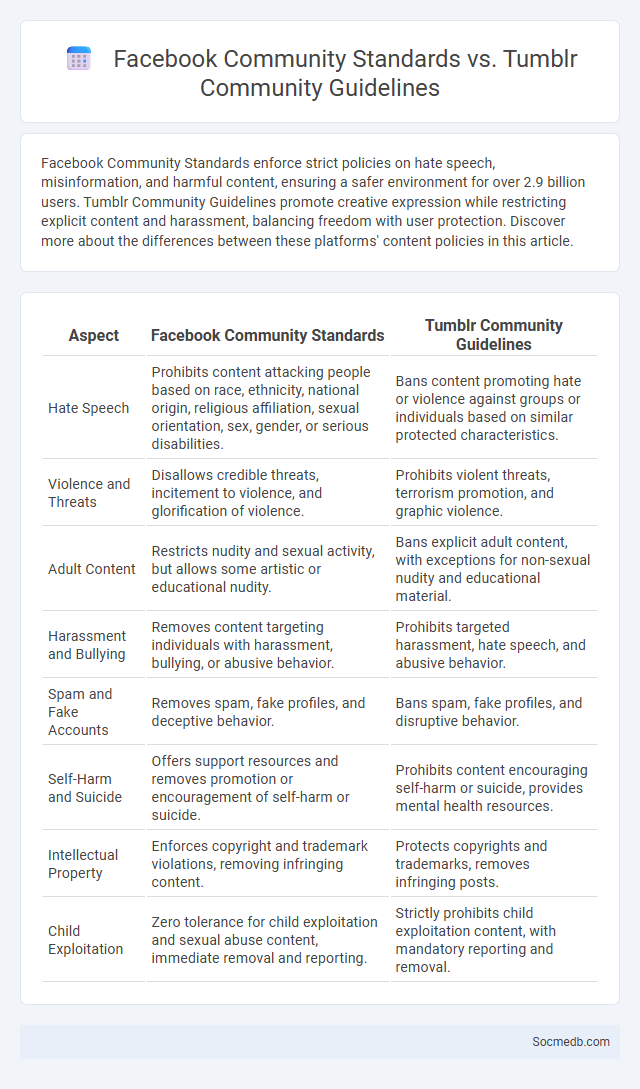
Photo illustration: Facebook Community Standards vs Tumblr Community Guidelines
Facebook Community Standards enforce strict policies on hate speech, misinformation, and harmful content, ensuring a safer environment for over 2.9 billion users. Tumblr Community Guidelines promote creative expression while restricting explicit content and harassment, balancing freedom with user protection. Discover more about the differences between these platforms' content policies in this article.
Table of Comparison
| Aspect | Facebook Community Standards | Tumblr Community Guidelines |
|---|---|---|
| Hate Speech | Prohibits content attacking people based on race, ethnicity, national origin, religious affiliation, sexual orientation, sex, gender, or serious disabilities. | Bans content promoting hate or violence against groups or individuals based on similar protected characteristics. |
| Violence and Threats | Disallows credible threats, incitement to violence, and glorification of violence. | Prohibits violent threats, terrorism promotion, and graphic violence. |
| Adult Content | Restricts nudity and sexual activity, but allows some artistic or educational nudity. | Bans explicit adult content, with exceptions for non-sexual nudity and educational material. |
| Harassment and Bullying | Removes content targeting individuals with harassment, bullying, or abusive behavior. | Prohibits targeted harassment, hate speech, and abusive behavior. |
| Spam and Fake Accounts | Removes spam, fake profiles, and deceptive behavior. | Bans spam, fake profiles, and disruptive behavior. |
| Self-Harm and Suicide | Offers support resources and removes promotion or encouragement of self-harm or suicide. | Prohibits content encouraging self-harm or suicide, provides mental health resources. |
| Intellectual Property | Enforces copyright and trademark violations, removing infringing content. | Protects copyrights and trademarks, removes infringing posts. |
| Child Exploitation | Zero tolerance for child exploitation and sexual abuse content, immediate removal and reporting. | Strictly prohibits child exploitation content, with mandatory reporting and removal. |
Introduction to Platform Community Guidelines
Social media platforms implement community guidelines to maintain a safe, respectful, and inclusive environment for all users. These rules govern acceptable behavior, content sharing, and interactions to prevent harassment, misinformation, and harmful activities. Understanding and following your platform's community guidelines ensures a positive experience and avoids penalties such as content removal or account suspension.
Overview of Facebook Community Standards
Facebook Community Standards outline the rules designed to maintain a safe, respectful environment for billions of users worldwide. These guidelines address harmful content, including hate speech, violence, and misinformation, to protect your experience on the platform. Compliance with these standards ensures that your interactions remain positive and your online community thrives.
Key Elements of Tumblr Community Guidelines
Tumblr Community Guidelines emphasize respect, prohibiting hate speech, harassment, and explicit content to ensure a safe environment. Users must avoid posting illegal material, including copyrighted content without permission, and must respect others' privacy. The platform enforces these rules through content moderation and reporting tools to maintain a positive community experience.
General Principles of Community Standards
Community standards on social media focus on protecting user safety, promoting respectful interactions, and preventing harmful content such as hate speech, misinformation, and harassment. Platforms implement detailed guidelines to enforce these principles through content moderation, user reporting systems, and automated detection tools. Adhering to these standards fosters a positive online environment that supports freedom of expression while mitigating risks to individuals and communities.
Content Moderation: Facebook vs Tumblr
Content moderation on Facebook prioritizes extensive algorithms and human reviewers to filter hate speech, misinformation, and violent content, ensuring user safety across its vast global user base. Tumblr employs a more community-driven approach combined with automated systems to handle content, especially focusing on adult material and harassment. Understanding these differences helps Your ability to navigate platform-specific rules and maintain a positive online experience.
Approach to Hate Speech and Harassment
Social media platforms implement advanced AI algorithms and machine learning techniques to detect and remove hate speech and harassment swiftly. Community guidelines strictly prohibit abusive content, with users empowered to report violations, boosting platform accountability and safety. Partnerships with NGOs and continuous policy updates enhance content moderation, fostering a respectful online environment.
Policies on Adult Content and Nudity
Social media platforms implement strict policies on adult content and nudity to maintain community standards and comply with legal regulations. Content that depicts explicit sexual acts, full nudity, or sexually suggestive material is typically restricted or removed to protect users, especially minors. Enforcement includes using AI-based content detection systems, user reporting mechanisms, and manual moderation to ensure adherence to these guidelines.
Enforcement Mechanisms and Reporting Tools
Enforcement mechanisms on social media platforms include automated content moderation, user reporting systems, and human review teams designed to uphold community standards and remove harmful content. Reporting tools empower you to flag abusive behavior, misinformation, or policy violations quickly, ensuring a safer online environment. These combined measures enhance platform accountability and promote user safety through timely intervention and transparent processes.
Transparency and User Appeals Process
Transparency on social media platforms ensures clear communication of content policies and data usage, fostering trust between users and providers. Your ability to appeal content decisions or account suspensions through a structured user appeals process guarantees fairness and accountability. This process often includes multiple review stages and timely responses to uphold user rights and platform integrity.
Comparing Flexibility and User Experience
Social media platforms vary significantly in flexibility and user experience, with Instagram offering a highly visual and intuitive interface ideal for creative content, while Twitter prioritizes real-time updates and concise communication, enhancing news sharing and engagement. Facebook provides extensive customization options and integration with various apps, delivering a versatile user experience that caters to both casual users and businesses. TikTok's algorithm-driven feed optimizes personalized content delivery, creating an addictive user experience focused on short-form video entertainment and discovery.
 socmedb.com
socmedb.com